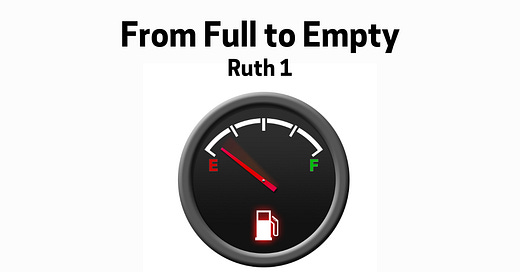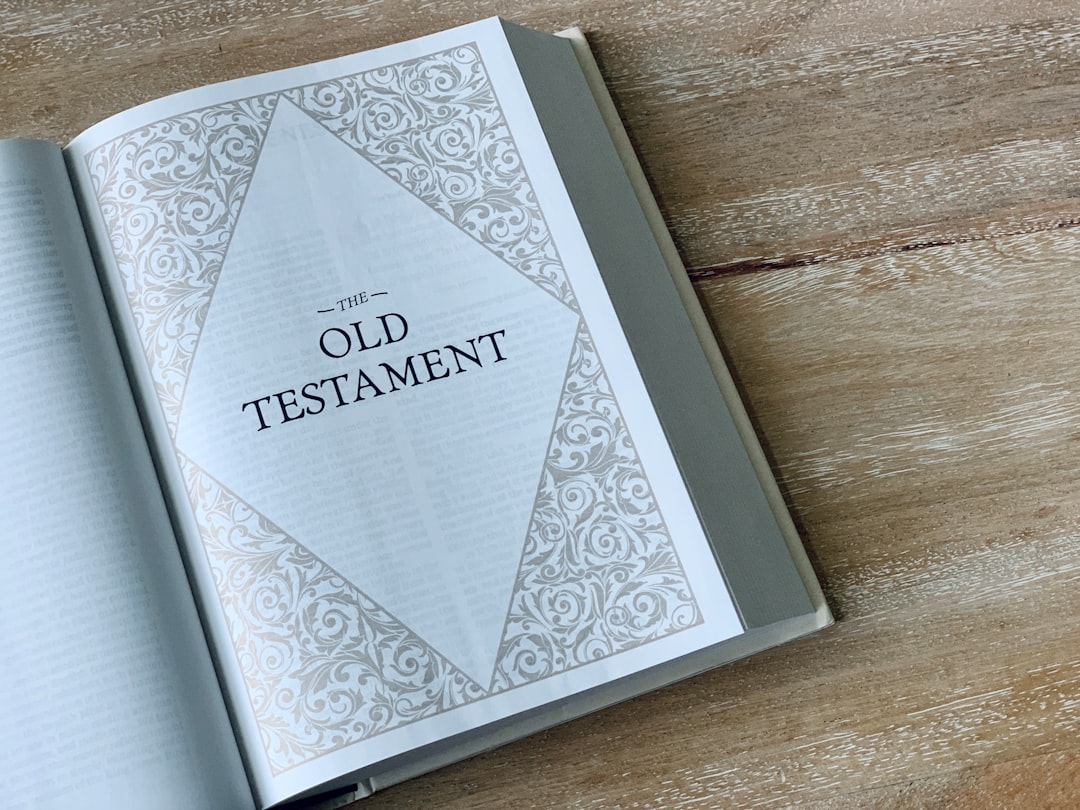
Have you ever had a time in your life when your life felt full – spiritually, family, job, home, etc. – only to have everything fall apart in front of you?
Maybe your home was destroyed.
Maybe you lost your job.
Maybe you had a loved one die.
Maybe your marriage collapsed.
Maybe your spiritual life took a beating as a result of everything that happened.
The book of Ruth begins with the unraveling of Naomi’s life. We read of her life going from full to empty in just a few verses.
And it’s during this time in Naomi’s life – we find out something about God.
When Life Falls Apart (Ruth 1:1-5).
Now it came to pass, in the days when the judges ruled, that there was a famine in the land. And a certain man of Bethlehem, Judah, went to dwell in the country of Moab, he and his wife and his two sons. The name of the man was Elimelech, the name of his wife was Naomi, and the names of his two sons were Mahlon and Chilion—Ephrathites of Bethlehem, Judah. And they went to the country of Moab and remained there. Then Elimelech, Naomi’s husband, died; and she was left, and her two sons. Now they took wives of the women of Moab: the name of the one was Orpah, and the name of the other Ruth. And they dwelt there about ten years. Then both Mahlon and Chilion also died; so the woman survived her two sons and her husband. (Ruth 1:1-5)
Some context.
“In the days when the judges ruled” is an ominous phrase about a dark period in Israel’s history (Judges 2:11; 21:25). While the text doesn’t specify, there’s a solid chance that this famine was a result of Israel’s unfaithfulness to the Lord (Deuteronomy 28:15, 23-24).
Another interesting detail from the context is that Naomi and her family were from Bethlehem, which means “house of bread.” Because of the famine, the ironic thing was there wasn’t enough food in the “house of bread.”
The move to Moab.
So Elimelech, Naomi, and their two sons travel to Moab to live there. Moab had consistently better farmland thanks to natural springs, and the soil retained rain better. So, during a time of famine, they went to Moab searching for “greener pastures.”
While this move may or may not have been considered a sinful thing, it was certainly a sad moment – an Israelite had left the Promised Land to live among the Gentiles. This wasn’t the first time God’s people had left the “Promised Land” because of a famine - remember Abraham and Jacob?
What happened in Moab.
Naomi and her family stay in Moab for ten years, and by the end of those ten years, Naomi’s husband and sons have died – leaving only her and her two daughters-in-law.
Naomi is referred to as “the woman” in verse 5 – which calls attention to the fact that not only had Naomi lost her family, but it’s as if she had lost her own identity.
Naomi’s life had fallen apart. She had gone from “full” to “empty.” She felt so empty. It was as if she didn’t even have an identity anymore.
Just One Loyal Friend during Adversity (Ruth 1:6-18).
Then she arose with her daughters-in-law that she might return from the country of Moab, for she had heard in the country of Moab that the LORD had visited His people by giving them bread. Therefore she went out from the place where she was, and her two daughters-in-law with her; and they went on the way to return to the land of Judah. And Naomi said to her two daughters-in-law, “Go, return each to her mother’s house. The LORD deal kindly with you, as you have dealt with the dead and with me. The LORD grant that you may find rest, each in the house of her husband.”
So she kissed them, and they lifted up their voices and wept. And they said to her, “Surely we will return with you to your people.” But Naomi said, “Turn back, my daughters; why will you go with me? Are there still sons in my womb, that they may be your husbands? Turn back, my daughters, go—for I am too old to have a husband. If I should say I have hope, if I should have a husband tonight and should also bear sons, would you wait for them till they were grown? Would you restrain yourselves from having husbands? No, my daughters; for it grieves me very much for your sakes that the hand of the LORD has gone out against me!”
Then they lifted up their voices and wept again; and Orpah kissed her mother-in-law, but Ruth clung to her.
And she said, “Look, your sister-in-law has gone back to her people and to her gods; return after your sister-in-law.” But Ruth said:
“Entreat me not to leave you, or to turn back from following after you; for wherever you go, I will go; and wherever you lodge, I will lodge; your people shall be my people, and your God, my God.
Where you die, I will die, and there will I be buried.
The LORD do so to me, and more also, if anything but death parts you and me.”
When she saw that she was determined to go with her, she stopped speaking to her. (Ruth 1:6-18)
The plan to go home.
Naomi decides to return home from Moab after hearing that the Lord had “visited” His people by giving them bread (1:6). The famine back home in Israel was over - there was bread once more in “the house of bread.”
Naomi’s future as a widow.
Naomi encouraged her daughters-in-law to return to their parent’s homes (1:7-14). As an elderly widow woman, her prospects were not very good – even back in Israel.
A woman who lost her husband and sons faced the worst fate that an Israelite woman could experience – a future of slavery, prostitution (Amos 7:17), or death. Older widowed women were basically homeless – living wherever they could, scraping by on whatever they could find to survive.
Since these events occurred during the time of the Judges, when faithfulness to God was at a low point, the people of her community may not have had enough respect for the Law to care for her. Today, Christians are commanded to provide for the needs of widows like this (1 Timothy 5:3-16; James 1:27).
Because she has nothing to look forward to, Naomi urges Orpah and Ruth to return to their homes, where they can be cared for by their family until they find another husband. Naomi rebukes them for trying to go with her - to do so was a form of “living suicide.”
Eventually, Orpah returns to her family’s house and gods, but Ruth stubbornly refuses.
Ruth’s faithfulness to Naomi.
Ruth’s determined, stubborn refusal to leave Naomi is on the “Mount Rushmore” of faithfulness and loyalty in the Bible (1:15-18).
As God swore never to forsake His people (Deuteronomy 31:6-8), so Ruth promises never to abandon Naomi.
Ruth commits to becoming an “adopted Israelite.” She would take on the home, people, and the God of Naomi. She would even be buried where Naomi was buried. She promises this to Naomi by the name of the LORD – and calls upon the LORD to kill her if she goes back on her promise.
Ruth totally and completely devotes herself to Naomi – putting Naomi above herself. She provides us with a beautiful illustration of what a God-glorifying love looks like (1 Corinthians 13:1-7).
After hearing what Ruth said and seeing her determination, Naomi stops trying to make her leave. They make the journey back to Bethlehem together.
The Darkness before the Dawn (Ruth 1:19-22).
Now the two of them went until they came to Bethlehem. And it happened, when they had come to Bethlehem, that all the city was excited because of them; and the women said, “Is this Naomi?” But she said to them, “Do not call me Naomi; call me Mara, for the Almighty has dealt very bitterly with me. I went out full, and the LORD has brought me home again empty. Why do you call me Naomi, since the LORD has testified against me, and the Almighty has afflicted me?”
So Naomi returned, and Ruth the Moabitess her daughter-in-law with her, who returned from the country of Moab. Now they came to Bethlehem at the beginning of barley harvest. (Ruth 1:19-22)
From Naomi to Mara.
When Naomi and Ruth return to Bethlehem, the women of the city excitedly come out to meet them and ask, “Aren’t you Naomi?” No doubt, these women were Naomi’s friends from when she used to live in Bethlehem.
But Naomi responds, “Don’t call me Naomi (which means “pleasant”) but call me Mara (which means “bitter”). She explained, “The Almighty has dealt very bitterly with me.”
The Almighty God.
The term “Almighty” for God is connected to His power and authority – 31 of the 48 times it occurs is in Job. The book of Job is a book full of suffering - and Job is another individual who felt like his life had gone from full to empty.
How Naomi and Job refer to God as the “Almighty” gives us something interesting to consider: when our life goes from full to empty, we need the assurance that God still reigns over all - that He’s still in control and still sitting on the throne.
The barley harvest.
Naomi and Ruth arrived in Bethlehem at the beginning of the barley harvest.
The situation certainly appeared dark, and Naomi’s life certainly felt empty – but the arrival of the harvest points to how God was about to provide for Naomi and Ruth.
There is a light at the end of the dark tunnel Naomi and Ruth had been traveling.
If you find this post helpful to your faith and valuable in your studies, please consider sharing it with a friend.
Centering on Christ from Ruth 1.
Sometimes we’re in Naomi’s position.
At the end of his life, Paul knew God had not forsaken him (2 Timothy 4:17), and he had a loyal friend who stood with him – Luke (2 Timothy 4:11).
When our lives go from full to empty, and we find ourselves in Naomi’s position, we need two things.
We need to remember that God is Sovereign and that He has not forsaken us.
We need loyal people who will not abandon us when our life is at its lowest point.
Sometimes we’re in Ruth’s position.
Sometimes, we find ourselves in Ruth’s position, faced with an uncomfortable choice to keep walking the road with one of God’s people whose life has gone from full to empty.
May we demonstrate the love of God by choosing to walk with those who feel empty.
Bear one another’s burdens, and so fulfill the law of Christ. (Galatians 6:2)
What Jesus did for us.
When we had chosen to sin and gone from full to empty spiritually, God did not abandon us. He sent His Son to die for us.
Ruth’s refusal to abandon Naomi in her emptiness points us to Christ. He was unwilling to abandon us to the fate we had earned because of our sins.
For when we were still without strength, in due time Christ died for the ungodly. For scarcely for a righteous man will one die; yet perhaps for a good man someone would even dare to die. But God demonstrates His own love toward us, in that while we were still sinners, Christ died for us. (Romans 5:6-8)
It is by His sacrifice and life that you can be full – that you can walk with God (Matthew 11:28-30; 1 John 1:5-10).














This is a very Good article Jameson! Thank you for your research and time spent in writing this! It is very encouraging! Looking forward to the next 3
Jameson, I just read your article in the Magnolia Messenger. Excellent! Your grandfather and grandmother were great people. We worshipped with them for many years at Southaven. Also remember when you attended there. Tell your sweet wife hello from Don and Madolyn. Have a great day.